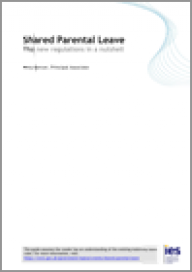Publications
 We author and publish a range of resources to keep you up to date with the latest developments in employment, labour market and human resource policy and practice.
We author and publish a range of resources to keep you up to date with the latest developments in employment, labour market and human resource policy and practice.
All our pdf publications are free to access.
Search results
-
📄
Event programme: 'Reflective Practice' skills:
Carter A, Wayne Bush M | Apr 2015 | Institute for Employment StudiesThe event programme from Alison Carter and Mary Wayne Bush's IES HR Network event 'Reflective practice skills workshop' on 16 April 2015
-

Shared Parental Leave: The new regulations in a nutshell
Mercer M | Mar 2015 | Institute for Employment StudiesThis paper offers a concise summary of the key facts you need to implement the new Shared Parental Leave and Pay regulations. It also offers an insight into the questions being asked by employers, and what they are doing to address the issues raised.
-

Impact evaluation of the Employer Investment Fund and Growth and Innovation Fund: project level learning and performance
Mackay S, Cook J, Agur M, Daff K, Hallam R, MacLeod K, Cox A | Mar 2015 | UK Commission for Employment and SkillsThis report sets out the evidence from a review of evaluation and monitoring evidence on the performance of two of UKCES’ investment funds, specifically the Employer Investment Fund (EIF) and the Growth and Innovation Fund (GIF). The report takes stock of the evidence on what the funds have achieved up to Summer 2014, and provides a summary of lessons to inform other investment programmes as well as policy development work.
-

Impact evaluation of the Employer Investment Fund and Growth and Innovation Fund: baseline qualitative findings
Cox A, Williams J, Aston J | Mar 2015 | UK Commission for Employment and Skills (UKCES)This is the first year interim research report on the findings from a series of seven qualitative case studies. The report forms part of a multi-year evaluation assessing the impact of the two investment programmes: the Employer Investment Fund (EIF) and the Growth and Innovation Fund (GIF).
-

Evidence Review on Regulation Culture and Behaviours
Wilson S | Mar 2015 | Food Standards AgencyIES was commissioned to carry out an evidence review to better understand the culture and behaviours in businesses and enforcement bodies, as well as the communication between these two groups that facilitate or inhibit compliance with regulation. This review is an update to the findings in the 2010 report, which examines the relevant evidence that has accumulated over the last four years.
-

Slides: What are the pros and cons of mindfulness at work?
Alison Carter | Mar 2015 | Institute for Employment StudiesAlison Carter's slides from the IES HR Network event 'Mindfulness at work', on 17 March 2015.
-

Slides: Workplace applications of mindfulness
Alison Carter | Mar 2015 | Institute for Employment StudiesAlison Carter's slides from the IES HR Network event 'Mindfulness at work', on 17 March 2015
-

Slides: What is mindfulness
Liz Hall | Mar 2015 | Editor, Coaching at work; Author, 'Mindful Coaching'Liz Hall's slides from the IES HR Network event 'Mindfulness at work', on 17 March 2015
-

Management and Leadership Development: Business Benefits for Jersey
Final Report
Tamkin P, Williams M | Mar 2015 | Institute for Employment StudiesThis report seeks to explore management and leadership skills and the development of management and leadership capability in Jersey based organisations. It draws on a previous piece of work undertaken by the Chartered Management Institute (CMI) and reported in 20121. The questionnaire used in the Jersey research deliberately draws on many of the questions used in the ‘2012 CMI’ survey to allow comparison and benchmarking.
-

Infographic: Interim findings on the Apprenticeships Trailblazers
Newton B, Gloster R, Miller L, Buzzeo J | Mar 2015 | Institute for Employment StudiesThe Apprenticeship Trailblazers aim to achieve greater employer ownership of Apprenticeship training. IES was commissioned to lead an evaluation of the early Trailblazers. This infographic highlights the key points of a report published this week by the Department for Business, Innovation and Skills, revealing the interim findings.
